The CO-ADAPT Project

Trento, December 12 2018 – Almost four million in funding to create an ambitious project: developing conversational artificial intelligence to support aging and active population. It is the overall budget of “Coadapt”, the international project funded by the European Commission under the Horizon 2020 program, in which the University of Trento will lead the research and development of conversational artificial intelligence prototypes. A large part of the funding (approx 700 thousand euros) will be allocated to the research group lead by the Prof. Giuseppe Riccardi with the Department of Engineering e Information Science (DISI). The conversational and intelligent system will be supported by wearable and sensing technology, such as wrist or arm band or rings. Ageing workers can count on support from remote to face-to-face interactions with psychotherapist to manage various sources of stress ( stressors ) in the workplace and in their personal life. The University of Trento has been chosen to host the kick off meeting, the meeting that officially starts the international project. The representatives of the partners met today in the Le Albere district for the first meeting and to discuss their workplan which will see them engaged for the next five years. The Italian-Belgian-Finnish network includes for Finland the University of Helsinki (coordinator), the University of Aalto, the Finnish Institute of Occupational Health (FIOH) and the company Etsimo Healthcare Ltd; for Belgium the company Innovation Sprint Sprl, for Italy the universities of Trento and Padua and the companies Idego Srl, BNP Srl and Electrolux Italia spa. The goal is the design, training and evaluation of intelligent systems to support healthcare professionals, patients and people in managing change in the workplace and in their personal life. «This integrated system will allow the doctor to develop personalized therapies or elaborate recommendations based on specific data collected on various touch points »explains Professor Giuseppe Riccardi, coordinator of the DISI research group. “The personal healthcare agents will be able to decode the surrounding environment, interpret the social behavior of the person and, at the same time, to detect the operating proxy data from human organs. For example, conversational agent will be able to listen to a voice, read a text, interpret a state of mind, a meaning, a basic emotion but also a complex emotional state. Sensors signals and analytics will be collected in real time, interpreted, summarized and made available to the healthcare professionals for an integrated intervention.” What we are doing at UNITN
